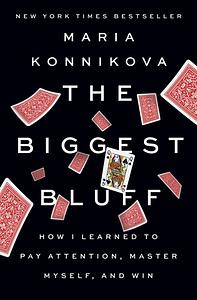Take a photo of a barcode or cover
365 reviews for:
The Biggest Bluff: How I Learned to Pay Attention, Master Myself, and Win
Maria Konnikova
365 reviews for:
The Biggest Bluff: How I Learned to Pay Attention, Master Myself, and Win
Maria Konnikova
Loved the weaving of science and poker, and exploration of luck.
Got some good advice out of this and learned more about poker. Solid 4/5 ⭐️
informative
inspiring
reflective
fast-paced
I listened to the interviews with the author on different podcast programs, which fed me the curiosity to read this book. Yet the book itself is a little disappointing, or should I say all the main points that the author wants to point out has already revealed during the podcasts, thus the book itself feels a little too long and repetitive.
For some reason, I took way too long to finally check this book out. It keeps popping up everywhere, and not only did I love a previous book I read by Maria, but I also love poker. Once I started this book, it was hard to put it down. I absolutely loved it.
Maria Konnikova is a journalist who spent most of her life studying psychology. She decided she wanted to try and become a poker pro, but not for the money. Something I've been really interested in lately is the balance between luck and skill because sometimes we can make the best decisions possible and still lose, and this is something Maria noticed as well. So, she decides to learn poker, and this is her story. Not only is she a great storyteller, but she also intertwines psychological studies and theories throughout the book. Even if you don't like or play poker, this is a great book for anyone who wants to become a better decision maker.
Maria Konnikova is a journalist who spent most of her life studying psychology. She decided she wanted to try and become a poker pro, but not for the money. Something I've been really interested in lately is the balance between luck and skill because sometimes we can make the best decisions possible and still lose, and this is something Maria noticed as well. So, she decides to learn poker, and this is her story. Not only is she a great storyteller, but she also intertwines psychological studies and theories throughout the book. Even if you don't like or play poker, this is a great book for anyone who wants to become a better decision maker.
Got about a third of the way through and couldn't go on. Too much errant observation and rumination, and not enough of a story.
Recommended by Nate Silver on a podcast, I thought I was getting into a book about Poker. This book is way better than a poker book and instead covers the process of learning something new and mastering the mental side when competing.
Sometimes the science-y stuff was tedious but when Konnikova was talking about her travels, mental game, tournaments, and personal beliefs about poker, the book was fascinating.
A lot of the critiques are about her writing style + the psychology that Konnikova spoke about, but as a person that followed poker casually for a long time and relates to her journey, I didn't really mind those parts.
Sometimes the science-y stuff was tedious but when Konnikova was talking about her travels, mental game, tournaments, and personal beliefs about poker, the book was fascinating.
A lot of the critiques are about her writing style + the psychology that Konnikova spoke about, but as a person that followed poker casually for a long time and relates to her journey, I didn't really mind those parts.
informative
inspiring
reflective
medium-paced
Enjoyed it.
A lot more like a memoir than her other books, which led me to not like it as much. But still some really good lessons on attention, reading others, and not letting people get into your head.
2.8/5
A lot more like a memoir than her other books, which led me to not like it as much. But still some really good lessons on attention, reading others, and not letting people get into your head.
2.8/5
This book reads like it's part memoir part self help. The author uses her Psychology background to study chance/risk and how it relates to the poker world and real life. I will admit this is not a book that I would normally pick up. I have absolutely no interest in poker, gambling, Vegas, etc. However, the psychological study of risk taking, how to take better risks in life, and how to read people enticed me. Those along with the Modern Mrs. Darcy's review of the book (who also claims not to like poker, but found the book interesting).
The opening chapters I really enjoyed. After that it really depended on the focus of the chapter- some were more poker specific (which I didn't find as interesting) and others were more psychology focused (which I really enjoyed).
I don't feel like I really learned anything new from this book, but I have noticed that I have been analyzing my decision making process more since I started this book. While some parts of the book dragged, others I found interesting. I cannot say it's the best book I've read, but it was interesting and I'm glad I decided to read it. 3.5*
The opening chapters I really enjoyed. After that it really depended on the focus of the chapter- some were more poker specific (which I didn't find as interesting) and others were more psychology focused (which I really enjoyed).
I don't feel like I really learned anything new from this book, but I have noticed that I have been analyzing my decision making process more since I started this book. While some parts of the book dragged, others I found interesting. I cannot say it's the best book I've read, but it was interesting and I'm glad I decided to read it. 3.5*




